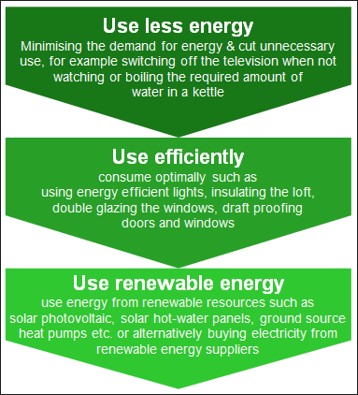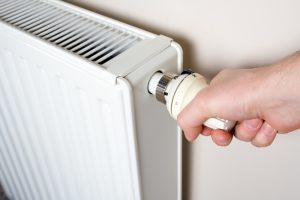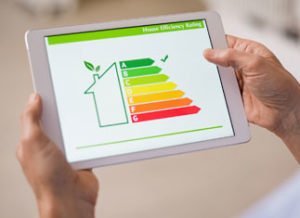
The energy hierarchy
NEA work with a range of clients, including local authorities, housing associations, network operators and manufacturers to understand how technology and innovation within the energy sector can help improve the lives of those living in fuel poverty.
The most sustainable way of reducing fuel poverty is to improve home energy efficiency. This has long since been NEAs mantra, as it ultimately reduces the amount of energy people need to live comfortably and reduce their energy bills.
Traditionally, solutions are based on the energy hierarchy: first behaviour change to reduce waste, then using technological solutions to reduce heat loss or improve energy efficiency, and finally generating heat and energy from renewable sources. All these interventions require a carefully planned resident support programme to ensure the benefits are maximised for the residents.
Research and evaluation by NEA’s Technical team quantifies how much difference new technologies can make to an individual, specifically those who might be vulnerable or living on a low income. We maintain a person-centred approach to evaluate, not only the performance of a product alone, but its usability, controllability and the impact it can have on an individual’s bills, comfort levels and satisfaction.
We work independently of manufacturers and conduct field trials to test technologies in situ rather than in a controlled environment, giving insight into how a technology is likely to perform in the community. NEA also provide tailored, accessible guidance and advice to householders to optimise on the potential benefit realisation.
As our focus shifts towards decarbonisation, even greater complexity in the energy sector is inevitable, from time of use tariffs and smart controllers, to hybrid heat pumps and the potential introduction of hydrogen. Increasingly in the low carbon future we will see more heat networks, demand management, and energy trading, as well as challenges around the electrification of transport. The landscape will become much more confusing for individuals, and the question will not simply be which gas boiler do I choose, but which heating solution works best for me and my home. Along this journey it is vital that we take the opportunity to also progress solutions which resolve affordability issues and ultimately reduce fuel poverty.
In this increasingly complex world, we also want to ensure that key decision-makers in the housing sector are adequately equipped and supported to make the right decisions on installing technologies into their stock. Our team can help by supporting you with resident engagement and consultation, providing insight and evidence to feed into investment strategies or independently evaluating the performance of a specific product. We also provide accredited training about the different solutions available and practical things you may want to consider when upgrading your assets.
If you’d like to talk to us about how we might be able to help get in touch with Michael Hamer, Technical Manager 0r telephone 07720 591406.




